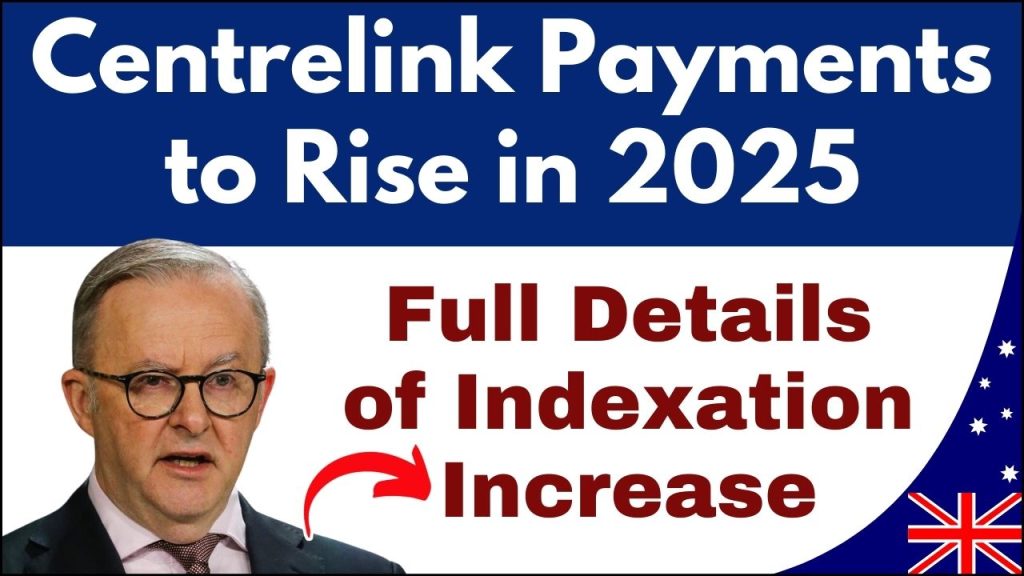
Centrelink Payments to Rise in 2025: Starting January 1, 2025, Centrelink payments will see a significant increase as part of the Australian government’s biannual indexation process. This adjustment is aimed at helping millions of Australians cope with the rising cost of living. The increases apply to various payments, including Youth Allowance, Austudy, ABSTUDY, and Carer Allowance. This guide breaks down the details of the changes, explaining who benefits, by how much, and why these updates matter.
Centrelink Payments to Rise in 2025
| Key Data | Details |
|---|---|
| Start Date | January 1, 2025 |
| Payments Affected | Youth Allowance, Austudy, ABSTUDY, Carer Allowance |
| Largest Increase | ABSTUDY payments for Master’s and Doctorate students – up by $54 per fortnight |
| Parental Income Test | Threshold raised to $65,189 per year for Youth Allowance |
| Official Source | Department of Social Services |
The 2025 Centrelink payment increases represent a vital lifeline for millions of Australians. Whether you’re a student managing tuition costs, a carer supporting a loved one, or someone living away from home, these adjustments provide meaningful financial relief. Stay informed by regularly checking your eligibility and updates from trusted sources like the Department of Social Services.
Why Are Centrelink Payments Increasing?
The Australian government adjusts Centrelink payments twice a year—in January and July—to ensure they keep pace with inflation. This indexation process ensures that vulnerable groups, including students, carers, and low-income earners, can maintain their purchasing power despite rising costs for essentials like food, rent, and utilities.
Inflation in recent years has risen at unprecedented levels, impacting everyday Australians’ ability to cover basic needs. Minister for Social Services Amanda Rishworth emphasized, “Our aim is to reduce disadvantage and maintain Australia’s strong social safety net, providing relief to those most in need.” The adjustments are designed to reflect real-world changes in living costs, particularly for the most vulnerable demographics.
Additionally, these increases aim to align Australia’s social safety net with similar welfare systems globally, ensuring Australians can rely on consistent and fair support when they need it most. The government also sees this as part of its broader strategy to mitigate poverty and enhance financial security for families and individuals.
Breakdown of Payment Increases
1. Youth Allowance
Youth Allowance supports young Australians pursuing higher education or training. Here’s how the payments will increase:
- Single, over 18, living at home: Payment rises by $17.30 per fortnight, from $459.80 to $477.10.
- Single or partnered, living away from home: Payment increases by $24.30 per fortnight, from $646 to $670.30.
- Parental Income Test Threshold: Families earning up to $65,189 per year can now qualify for support.
Example: Sarah, a 19-year-old student living at home, will now receive $477.10 every two weeks, helping her manage education-related expenses.
These increases mean more students, particularly those from low- and middle-income families, can access financial aid to focus on their studies without undue financial stress. Youth Allowance plays a pivotal role in ensuring educational access for all Australians.
2. Austudy
Designed for students aged 25 and older, Austudy also sees a boost:
- Single with dependent children: Payment increases by $30.60 per fortnight, from $815.20 to $845.80.
- Partnered recipients: Payment rises by $26.30 per fortnight, bringing the new rate to $725.80.
Austudy recipients, often balancing work, study, and family responsibilities, will find these increases critical in meeting daily expenses. The rise reflects the higher financial pressures older students frequently encounter.
3. ABSTUDY
ABSTUDY supports Indigenous students. In 2025, the largest increases target higher education students:
- Master’s or Doctorate students: Payment increases by $54 per fortnight, reaching $1,231.40.
These increases highlight the government’s commitment to promoting higher education among Indigenous communities, ensuring equitable opportunities for academic and professional success. By easing financial barriers, these adjustments aim to encourage greater participation in advanced studies.
4. Carer Allowance
Over 660,000 carers benefit from this payment, which is increasing by $5.80 per fortnight to a new total of $159.30. This small but meaningful adjustment helps carers meet the demands of their role.
Carers often face unique challenges, including reduced income due to caregiving responsibilities. This modest increase acknowledges their invaluable contribution to society and aims to ease some of their financial burden.
Additional Context and Practical Insights
Impact on Students and Families
The rise in Youth Allowance and Austudy payments can significantly alleviate financial strain for students, allowing them to focus more on academics. For families, the increased parental income test threshold ensures more households qualify for support, directly benefiting children and young adults in higher education.
Economic Rationale
By increasing payments, the government injects more money into the economy, supporting local businesses as recipients spend on essentials. This dual-purpose approach—providing financial aid while stimulating economic activity—underpins the indexation process.
Eligibility Expansion
The raised thresholds mean families previously excluded due to higher incomes may now qualify for payments. This expanded eligibility reflects the government’s intent to assist a broader segment of the population during challenging economic times.
How to Apply or Update Your Details for Centrelink Payments
If you’re an existing recipient, ensure your details are up-to-date via your Centrelink account. New applicants can check their eligibility and submit applications online or through their local Centrelink office. Be prepared to provide income details, identification documents, and evidence of your circumstances.
How to Check Your Eligibility
If you’re unsure whether you qualify for these payments, follow these steps:
- Visit the Centrelink Website: Start by logging into your Centrelink account.
- Use the Eligibility Calculator: The online tools can help determine your eligibility for Youth Allowance, Austudy, or ABSTUDY.
- Check Income Thresholds: Ensure your or your family’s income doesn’t exceed the updated limits.
- Contact Centrelink: Speak with a representative if you have specific questions.
To avoid delays in receiving payments, applicants should regularly check for updates or required actions in their Centrelink account.
Frequently Asked Questions (FAQs) About Centrelink Payments to Rise in 2025
1. When will I see the increase in my payments?
The new rates take effect from January 1, 2025, so you’ll see the increase in your first payment of the year.
2. Will this increase affect all Centrelink payments?
No, the increase applies only to specific payments like Youth Allowance, Austudy, ABSTUDY, and Carer Allowance.
3. How often are Centrelink payments adjusted?
Centrelink payments are adjusted twice a year to account for inflation and other economic factors.
4. Can I still apply for these payments if I’m not currently receiving them?
Yes, applications are open year-round. Use the eligibility tools on the Centrelink website to apply.
5. What should I do if my circumstances change?
If your income, living situation, or family composition changes, update your Centrelink account immediately to avoid overpayments or interruptions.











